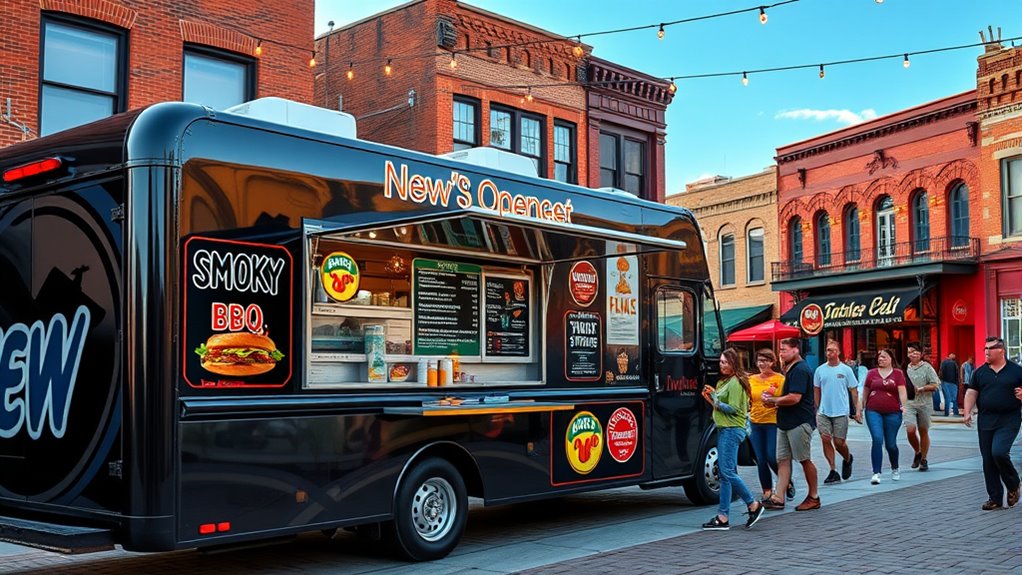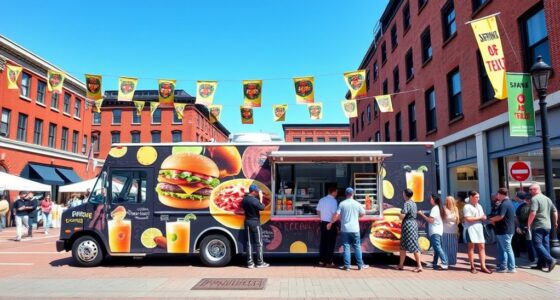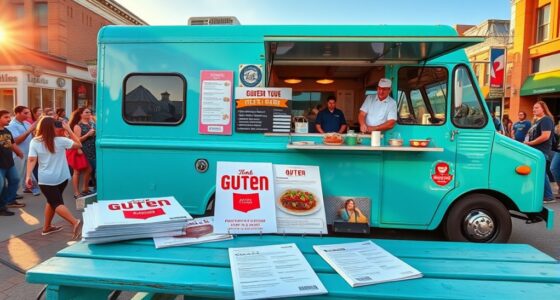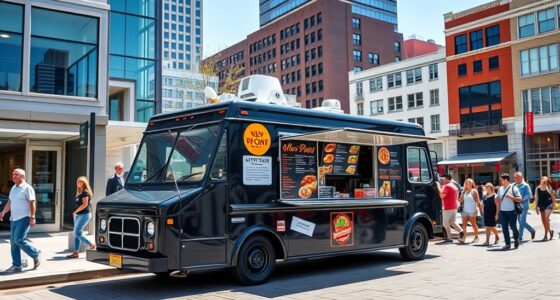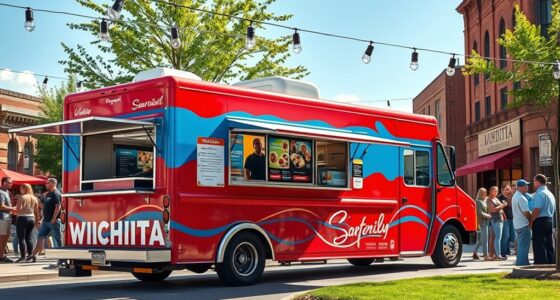To open a food truck in Bowling Green, Kentucky, you’ll need permits from the local health department, including a mobile food unit permit costing around $300 annually, and operate within location restrictions like avoiding overnight street parking or fire hydrants. Startup costs can range from $50,000 to $150,000 for a vehicle, plus permit and licensing fees. Focus on a simple menu, effective marketing via social media, and participation in local events. More details will help you navigate each step confidently.
Key Takeaways
- Obtain health department and mobile food unit permits through the Bowling Green Office of Occupational License, ensuring compliance with safety and location regulations.
- Startup costs range from $50,000 to $150,000 for vehicle purchase and customization, plus annual licensing fees of approximately $1,864 to $3,000.
- Secure operating locations by adhering to permits for public rights-of-way and private property disclosure, avoiding restricted zones and overnight parking.
- Develop a simple, signature menu with seasonal and dietary options, focusing on quick-prep dishes to enhance customer experience.
- Use social media platforms like Facebook and Instagram for marketing, event participation, and building community engagement to grow your customer base.
Navigating Permits and Licensing in Bowling Green
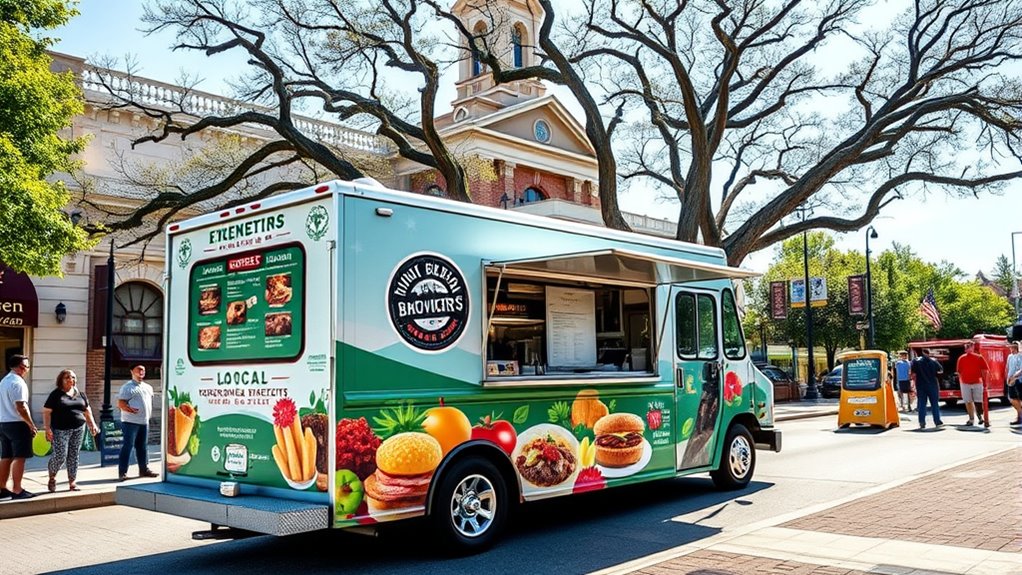
Planning permits and licensing in Bowling Green is a straightforward process if you understand the requirements. First, you’ll need a health department permit to meet food safety standards, which involves menu approval and daily cleaning. The application and inspections are handled locally, with fees varying by county—contact Bowling Green’s health department for exact costs. To operate on public rights-of-way within city limits, you must obtain a Mobile Food Unit Permit, costing $300 annually, with each vehicle requiring a separate permit. You’ll need to submit a detailed application with documentation proving compliance with fire safety and noise regulations. All permits are issued through the Bowling Green Office of Occupational License. Keep in mind, inspections are regular, and renewal is mandatory to avoid suspension or revocation of your operating privileges. Additionally, understanding juice detox benefits and regulations can help ensure your food truck offerings align with health standards and customer expectations.
Estimating the Costs to Launch Your Food Truck Venture
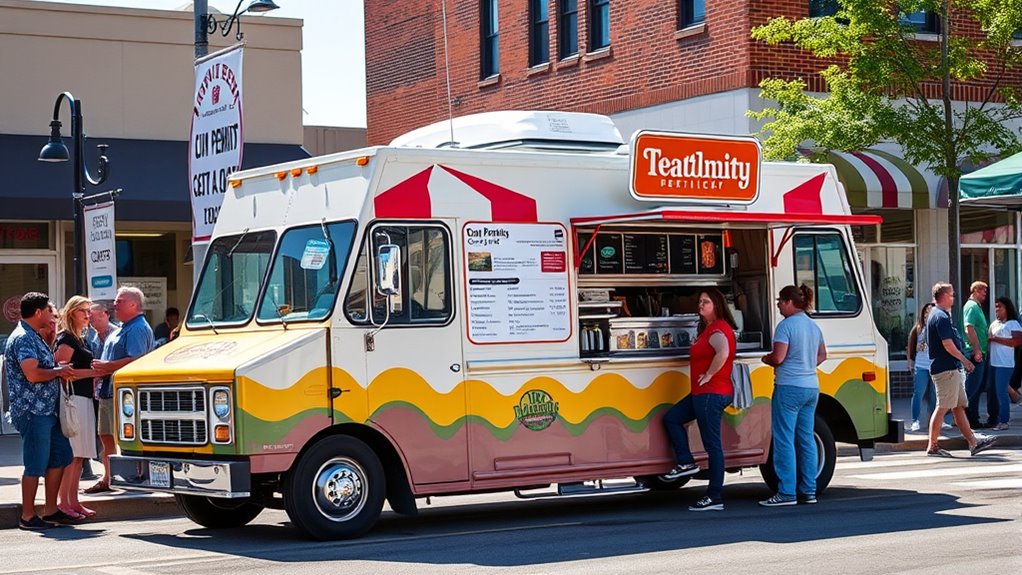
Launching a food truck in Bowling Green involves careful budgeting across multiple cost categories. Vehicle costs vary widely; a new custom trailer with full kitchen setup can range from $50,000 to $150,000, while used trucks may be cheaper but could require repairs and upgrades to meet Kentucky standards. Essential cooking equipment like fryers and grills also impact your budget, depending on your menu focus. Licensing and permit fees typically range from $1,864 to $3,000 annually, with additional costs for event permits and inspections. Initial inventory costs around $2,000 to $3,000, plus supplies and fuel, which can total $1,200 to $2,500 yearly. Marketing expenses, including vehicle wraps and social media campaigns, often range from $7,000 to $25,000 to establish your brand and attract customers. Start-up costs for a food truck in Kentucky vary, depending on whether you buy new or used, and the level of customization required. Additionally, understanding leasing options for vehicles can help you manage your costs more effectively if purchasing outright isn’t feasible.
Understanding Location Regulations and Operating Restrictions
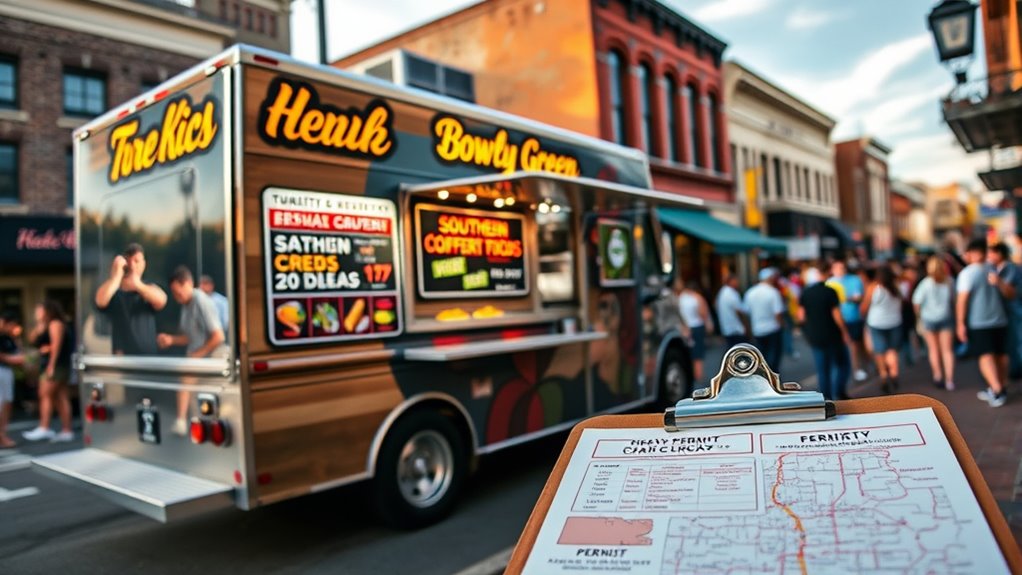
Understanding where you can operate your food truck in Bowling Green is essential for staying compliant with local regulations. You need permits to operate on public rights-of-way, and operating on private property requires a disclosure statement. Food trucks can’t park overnight on public streets or sidewalks and must avoid restricted zones near fire hydrants, bus stops, or certain food establishments. Proper signage, such as a color-coded sticker, must be visible during operation. Additionally, knowing the forsale 100 regulations helps ensure your business stays within legal parameters.
Ensuring Food Safety and Health Compliance
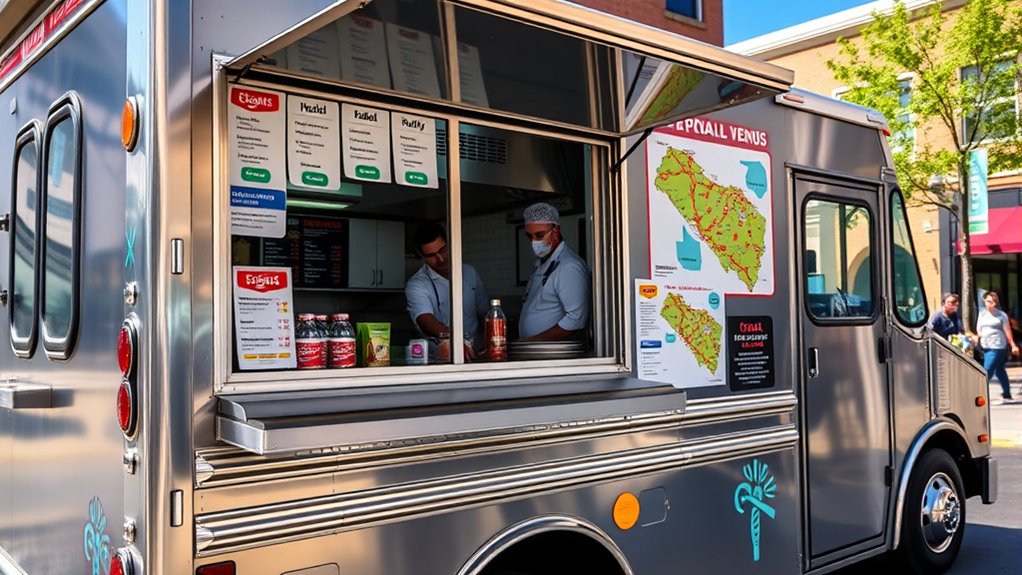
To keep your food truck compliant, you need to follow regular inspection protocols and maintain proper food handling standards. This means obtaining and renewing your permits, passing routine health checks, and training your staff on safe practices. Staying proactive guarantees you meet all safety requirements and avoid penalties or closures. Additionally, ensuring compliance with permitting requirements is essential, as failure to do so can result in fines or suspension of your operating license. Regularly reviewing cookie policies and staying informed about changes can help you maintain transparency and trust with your customers.
Regular Inspection Protocols
Regular inspection protocols for food trucks in Bowling Green, Kentucky, guarantee they meet strict health and safety standards by conducting inspections typically twice a year. During these inspections, health officials examine critical areas such as food storage, worker hygiene, temperature controls, equipment condition, and pest presence. You need to maintain a minimum score of 85 to pass without follow-up, while scores below 85 or critical violations trigger reinspection. Critical violations, like improper handwashing or temperature issues, require immediate correction and follow-up within 30 days. Failure to address violations can lead to permit suspension or closure. Additionally, fire safety measures—including hood systems, extinguishers, and propane systems—are inspected regularly. Ongoing compliance is essential to keep your food truck operational and ensure public safety. Follow-up inspections are required if the total score falls below 85 or if critical violations are observed, and these can be conducted on the same day or within 30 days to help ensure continued compliance and safety improvements. Maintaining food safety standards is crucial for safeguarding public health and sustaining your business reputation.
Food Handling Standards
Maintaining proper food handling practices is essential for ensuring safety and compliance in Bowling Green’s food trucks. You must handle foods carefully to prevent contamination, especially for potentially hazardous items that require temperature control. Enclosed or screened booths help protect food from insects and environmental contaminants, while external cooking is only allowed if food is returned to a protected area. Permitted food handling practices are outlined by local health authorities to ensure safety. Key considerations include: – Having self-contained handwashing facilities or a handwash setup with water containers and catch basins. – Using a three-compartment sink for utensil sanitation in self-contained units. – Storing food at correct temperatures during transport and onsite to prevent bacterial growth. – Returning daily to a commissary for restocking, cleaning, and proper storage to meet health standards. Additionally, understanding and implementing food safety protocols is crucial for maintaining health standards and preventing foodborne illnesses. Adhering to these standards keeps your operation safe and compliant with Kentucky regulations.
Crafting a Menu That Fits Your Mobile Business Model
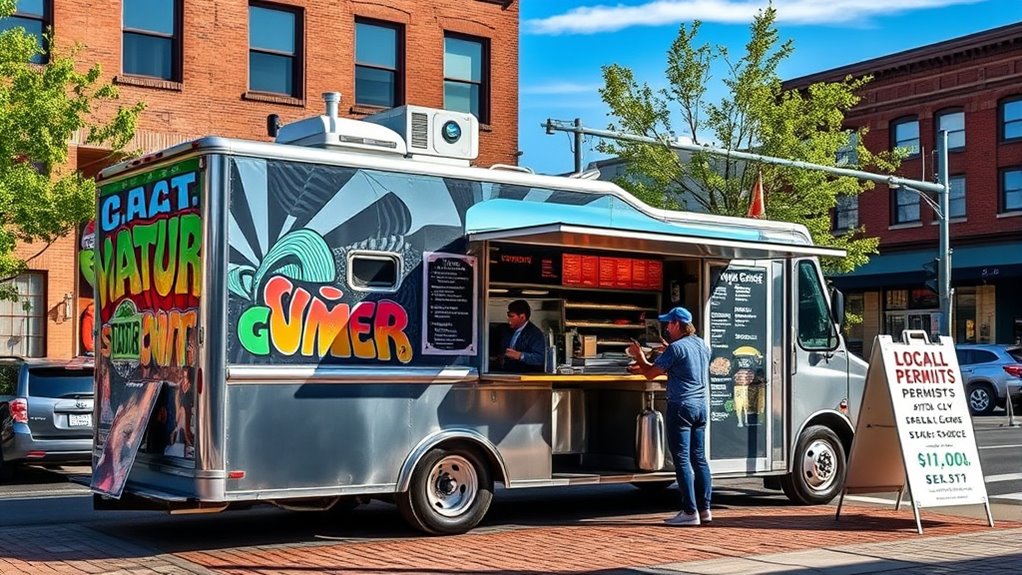
Crafting a menu that fits your mobile business model means focusing on simplicity, speed, and quality. Limit your menu to 8-15 main items to prevent overwhelming customers and slow service. Highlight signature dishes or specialties prominently on your menu board to attract attention. Incorporate options that cater to dietary restrictions like vegetarian or gluten-free choices, broadening your customer base. Design dishes that can be prepped in advance or prepared in under five minutes to ensure quick turnaround times. Organize your menu to feature best-sellers and upsell opportunities for efficient service. Use seasonal ingredients to keep offerings fresh and cost-effective, rotating specials regularly to entice repeat visits. Prioritize high-quality ingredients and stay adaptable to food trends and customer feedback for ongoing menu relevance. Conduct market research by visiting local food markets and observing popular stalls with long lines to identify what is in demand and tailor your menu accordingly. Additionally, exploring innovative electric bike conversion kits can be beneficial if you plan on offering delivery services using eco-friendly transportation options.
Effective Marketing Strategies to Grow Your Food Truck Business
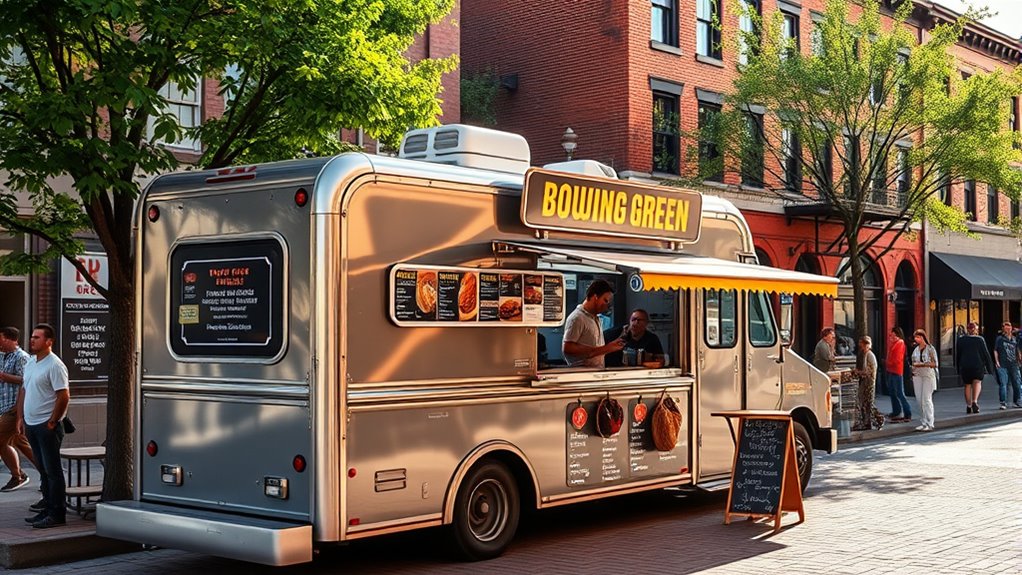
To grow your food truck business, you should focus on leveraging social media platforms like Facebook and Instagram to boost visibility and engage customers. Partnering with local events and festivals can increase foot traffic and fortify your brand presence in Bowling Green. Building strong relationships with your customers through loyalty programs and targeted marketing helps guarantee repeat business and long-term success. Implementing loyalty programs has been shown to result in a 30% increase in repeat visits, making it a crucial strategy for sustained growth. Additionally, offering high-quality honey products as part of your menu or promotional items can attract health-conscious customers and differentiate your food truck from competitors.
Leverage Social Media Platforms
Have you considered how social media platforms can directly boost your food truck’s visibility and customer engagement? Real-time location updates on Twitter and Instagram Stories keep customers informed about your current and upcoming stops, encouraging spontaneous visits. Geotagging posts enhances local discovery, while automated scheduling maintains consistent alerts without extra effort. High-quality photos and short videos on Instagram and TikTok showcase your dishes and behind-the-scenes moments, making your truck more “Instagrammable” and increasing shareability. Collaborating with local influencers and encouraging user-generated content (UGC) can notably expand your reach and credibility. Focus on platforms like Facebook for local audiences and Instagram or TikTok to target Millennials and Gen Z. Consistent posting and engaging with followers through comments and messages further increase foot traffic, foster loyalty, and keep your brand top-of-mind. Additionally, understanding how angel numbers relate to your personal and business growth can provide unique insights and motivate strategic decisions in your marketing efforts.
Partner With Local Events
Partnering with local festivals and community events can considerably boost your food truck’s visibility and sales in Bowling Green. Events like White Squirrel Arts Fest and BG Wine Fest offer vendor opportunities with simple application processes and affordable fees, attracting high foot traffic and diverse crowds. To secure a spot, submit your application early, as spots are often filled on a first-come, first-served basis. Participating in downtown events like Harvest Fest, farmers markets, or Fountain Row Friday can establish repeat customers and strengthen community ties. Building relationships with event organizers and venue managers helps secure prime locations and guarantees compliance with regulations. Use these events for on-site marketing, signage, and collecting customer contacts, boosting your brand’s reach and sales potential. Registration and fees are straightforward, with a $25 fee for food trucks and vendors, and early registration increases your chances of securing a spot. Additionally, understanding local regulations related to permits and health codes ensures smooth operation during these events.
Build Brand Recognition
Building a strong brand is key to standing out in Bowling Green’s competitive food truck scene. Effective branding helps attract loyal customers and boosts your visibility. You should focus on developing a memorable visual identity and consistent messaging that resonates with your target audience. Social media is a powerful tool—68% of food trucks use it regularly, with Facebook leading at 75%. Engaging campaigns can increase sales by about 20%, and 40% of customers discover trucks through social ads. Loyalty programs and email marketing also drive repeat business, with over half of trucks implementing them. Additionally, leveraging data analytics, GPS apps, and personalized promotions enhances customer experience and marketing ROI. Building a distinctive brand guarantees you stay memorable and competitive in Bowling Green’s vibrant food scene.
Effective marketing strategies such as targeted community engagement, online ordering, and collaborations with local businesses can further accelerate your growth and establish your truck as a local favorite.
Frequently Asked Questions
Are There Specific Times or Days When Food Trucks Can Operate in Bowling Green?
You might wonder if there are specific times or days when food trucks can operate in Bowling Green. Generally, food trucks operate during peak meal hours like midday and sometimes evenings, especially at designated parks like Soul of Kentucky on Wednesdays and Fridays from 11 AM to 2 PM. Check local park schedules and social media updates for exact days and times, since rules and hours can vary by location.
Can I Operate My Food Truck at Multiple Private Locations Without Additional Permits?
You can operate at multiple private locations without endless permits, but only if you submit a thorough compliance statement covering all sites. It’s like having a golden ticket—no need for separate permits for each spot! Just make sure you follow local zoning and health rules, and inform the health department if needed. As long as you stay within these guidelines, you’re free to serve at multiple private sites without extra permits.
What Are the Requirements for Parking and Maneuvering Food Trucks on City Streets?
You need to follow Bowling Green’s parking and maneuvering rules for food trucks. Park for no more than four hours, stay at least ten feet from structures, and avoid blocking sidewalks or fire lanes. Make sure your truck has a valid permit with a visible sticker, and adhere to safety and noise regulations. Maintain clear sightlines and enough space for safe ingress and egress, and never leave your truck unattended overnight on streets.
How Often Do Health Inspections Need to Be Scheduled or Renewed?
You need to schedule health inspections at least twice a year in Bowling Green, KY. Your permits must be renewed annually, and your food safety certifications are valid for three years. If issues arise, inspectors may increase visit frequency. Temporary permits for events are valid only during the event, requiring separate applications. Regular inspections help make certain you stay compliant with local health and safety standards, preventing delays or permit revocation.
Are There Restrictions on Alcohol Sales or Serving Alcohol From Food Trucks?
Did you know that Kentucky bans free alcohol sales, impacting food truck promotions? You can’t serve alcohol from your food truck without specific permits, and local laws restrict locations and times for alcohol sales. Serving complimentary drinks is illegal, and you need to follow strict licensing rules. To avoid fines or license suspension, guarantee you display all licenses, comply with local ordinances, and coordinate with authorities for any special permits.
Conclusion
Starting your food truck in Bowling Green means maneuvering permits and costs, but the real flavor comes from your menu and marketing. While regulations set boundaries, your creativity and passion turn limitations into opportunities. Remember, success isn’t just about following rules—it’s about standing out in a crowded market. So, embrace the challenge, craft a unique experience, and let your food truck become a vibrant part of Bowling Green’s bustling community.
